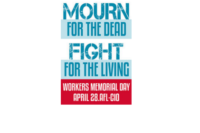In Italy, tomorrow’s International Workers Memorial Day events will include a MAI PIU’ AMIANTO (No More Asbestos) rally in Rome, promoted by the country’s trade unions.
Asbestos will also come under the gun in Canada, where that country’s unions will renew their call for a comprehensive ban on the hazardous material on the day they call the National Day of Mourning for workers killed, injured or made ill on the job.
“Asbestos is the leading cause of work-related death in Canada, and with imports on the rise, the danger is increasing,” said Canadian Labour Congress (CLC) president Hassan Yussuff.
More than 2,000 Canadians die every year from diseases caused by asbestos exposure, like mesothelioma and lung cancer. Death from mesothelioma increased 60 percent between 2000 and 2012. Internationally, the World Health Organization reports more than 100,000 asbestos-related deaths per year.
Compliance with existing OSH laws
In the Phillippines, unions are using the day as an opportunity to call on multinational corporations to comply with occupational health and safety laws. The national labor center Kilusang Mayo Uno (KMU) will host an International Solidarity Affair (ISA), gathering workers, trade-union activists, labor rights advocates, friends and supporters of the working class.
The ISA this year will include an emphasis on local victims -- such as workers who died in the Kentex factory fire -- an exposure program to take place in workers’ communities and picket lines; and an international forum on Occupational Health and Safety.
In Venezuela, the Central de Trabajadores Alianza Sindical Independiente (ASI) will concentrate events in three Venezuelan states: Tachira, Mérida and Trujillo, where awareness raising events about occupational health and safety will be take place.
A demand for new OSH laws
And across Europe, safety advocates are demanding new health and safety laws.
“Workers need better protection,” said Esther Lynch, of the European Trade Union Confederation. “New laws are needed now. The most efficient and effective way to protect workers from workplace disease and injury is through laws at European Union (EU) and national level. Workers’ health protection should not be deregulated or privatised. Strong laws should be backed up by strong enforcement and a strong system of workplace health and safety representatives.”
The ETUC says the new laws should
- Implement binding occupational exposure limits for at least 50 cancer-causing substances, instead of the current 5, in 2016 instead of delaying until 2020;
- And cover nanoparticles; psycho-social risks including stress, violence and harassment; and neck, back and elbow pain
The union says that one directive – on carcinogens and mutagens – has been under review by the EU for some 12 years without any movement. Following trade union pressure, the European Commission has promised progress this year on protecting workers from cancer. Nanomaterials, however, continue to be largely unregulated.
“Concerns about the ‘compliance costs’ of regulation for business ignore the costs to workers and their families,” added Lynch, “and should not stop action to prevent workplace accidents and disease.”
According to the ETUC:
- Between 2010 and 2015 there has been a rise in the percentage of workers handling chemicals and infectious materials.
- Half of all workers consider work-related stress to be common in their workplace.
- More than 2 in 5 workers work in painful or tiring positions for a quarter or more of their working time.



